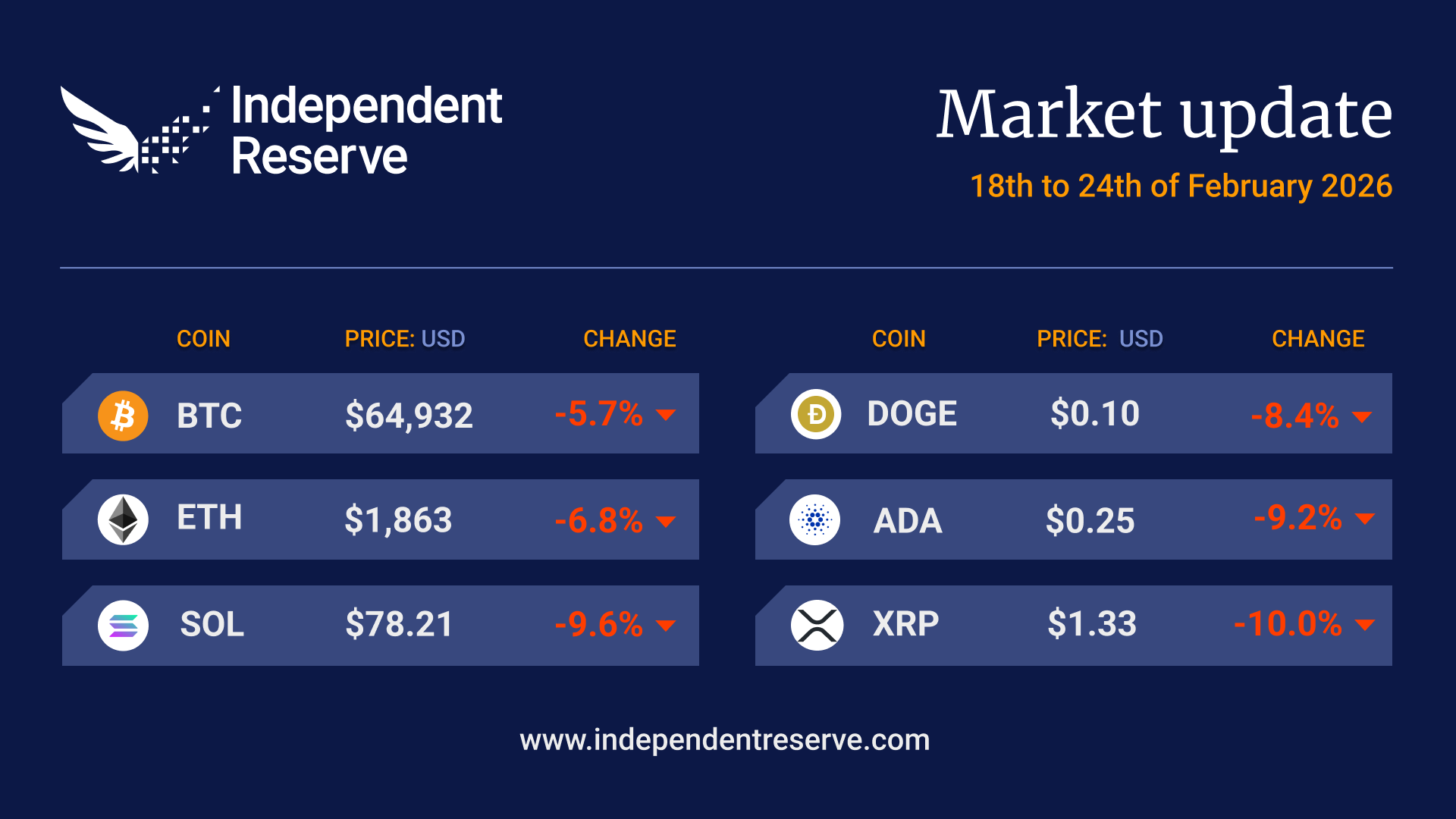In Markets
Bitcoin has been in a bull market for 952 days now, according to BitcoinNews.com, seeing a peak of 6.2x gains so far this cycle. However, the major price action happened in short bursts over just 36 days, with Bitcoin trending sideways the rest of the time. With Bitcoin just a few thousand dollars short of a new all-time high, stocks already breaking records, and with Strategy potentially entering the S&P 500 in the coming months, the best may be yet to come. The US dollar index (DXY) is at three-year lows, which has historically preceded big Bitcoin price moves.
TradFi is getting on board in a big way, with Ric Edelman, founder of Edelman Financial Engines which manages US$300 billion (A$455B) in assets, this week calling for clients to allocate up to 40% of their portfolios to crypto. “Owning crypto is no longer a speculative position; failing to do so is,” Edelman said. The Bitcoin ETFs hauled in US$2.214 billion (A$3.36B) last week, and the Ether ETFs took US$283.5M inflows (A$429.5M). Activity has also returned to the Ethereum L1, which saw the daily transactions average get up to 1.45M this week for the first time since 2021. The Crypto Fear and Greed Index is at 64, or Greed.

In Headlines
Tom Lee’s ‘Microstrategy of Ethereum’
Bitcoin bull Tom Lee has been appointed chair of Bitcoin miner BitMine Immersion Technologies, which announced a US$250M (A$380M) private placement to implement its Ethereum Treasury strategy with the aim of becoming the biggest publicly traded holder of Ether. Lee told CNBC that stablecoins are the “ChatGPT” of crypto and are largely on Ethereum. “That is really the backbone and architecture of stablecoins, so it’s important to create a project that accumulates Ethereum,” he said. BitMine stocks surged 670% on the news. Another Bitcoin mining company, Bit Digital, has also announced plans to wind down its Bitcoin mining operations to become an Ethereum staking and treasury company.
US regulators approve tokenised stocks
The first tokenised US stocks platform called Dinari has secured a broker-dealer registration and will launch in the coming months. Dinari will white label its service and allow other companies to integrate the platform. Its tokenised equities, called dShares, are already available on the BASE network for customers outside the US. Investment platform Republic plans to offer a tokenised version of shares on Solana for 20 private companies, including SpaceX and Perplexity.
Solana staking ETF this week
REX Shares has announced the launch of the REX-Osprey SOL + Staking ETF this week. It’s the first ever staked crypto ETF in the US, and leapfrogs over the fact Solana doesn’t yet have a spot ETF. The REX ETF was filed under a novel C-corporation format to bypass the typical 19-b rule change process that the other ETFs are pursuing. Meanwhile, the SEC just delayed staking approval for the Bitwise Ethereum ETF, with some speculating the move is due to the lengthy delay to unstake funds in Ethereum.

Robinhood chooses Arbitrum
Retail stock trading giant Robinhood will use Ethereum Layer 2 Arbitrum to offer 200 tokenised stocks to European clients for trading 24 hours a day, five days a week. The news is a vote of confidence in Ethereum’s L2 roadmap, after reports two months ago that Robinhood was seriously considering tokenising stocks on Solana. The interface will appear just like the normal Robinhood app to consumers, but with blockchain rails underneath. Robinhood will launch its own L2 in future.
Ripple news
A New York judge has denied Ripple and the SEC’s joint request to lift an injunction and lower the fine imposed on the company. The news overshadowed Ripple’s announcement of a new partnership with Wormhole to add support for the XRPL network and the XRPL EVM sidechain, enabling cross-chain messaging and asset movements. Ripple has also partnered with AEON’s global payment network to enable XRP and Ripple USD payments across 20 million merchants across Southeast Asia.
Bitcoin assessed for mortgages
The US Director of Federal Housing Bill Pulte has told the government-run Fannie Mae and Freddie Mac to formally consider counting “cryptocurrency as an asset for a mortgage.” Only digital assets held on US-regulated centralised exchanges would qualify, and the lenders must design safeguards to account for crypto’s volatility.

Singapore’s new crypto rules
Singapore’s new crypto rules have just come into force, requiring entities offering digital token service to overseas clients to obtain a Digital Token Service Provider license – which MAS has warned will only be issued in “extremely limited circumstances.” The rules aim to tackle regulatory arbitrage, and breaking the rules can result in penalties, including a 250,000 SGD fine and jail for three years.
Japan is paving the way for ETFs and lower taxes
Japan’s Financial Services Agency (FSA) has proposed reclassifying crypto, potentially allowing ETFs and a flat 20% capital gains tax (down from rates as high as 55%). If accepted, the proposal would recognise crypto as “financial products” under the same regulatory framework governing securities and traditional financial products. Part of Japan’s broader “New Capitalism” strategy, the move coincides with domestic efforts to commercialise stablecoins for use in settling tokenised real-world assets. This is no doubt welcome news to the country’s booming crypto industry, with over 12 million active domestic crypto accounts held as of January 2025, and assets held on crypto platforms exceeding US$34 billion (A$51.7B).
Good signs for crypto in Korea
The Korean crypto market is heating up again, with a new report from Hana Financial Research Institute finding 27% of Koreans aged between 20 and 50 now own crypto, and 70% interested in investing more in the future. Eight major South Korean banks have also just formed a consortium to develop the country’s first won-based stablecoin, to be finalised later this year or early next year. Kakao and Naver (the local Google and Facebook equivalents) have filed stablecoin trademark applications, with Kakao Pay stocks surging 148% in June alone. The Digital Asset Basic Act, which will regulate stablecoins, is currently under review in the country’s National Assembly. Amid the stablecoin push, the country’s central bank has paused development of its CBDC.

Hong Kong releases crypto policy 2.0
Hong Kong has released its “Policy Statement 2.0 on the Development of Digital Assets in Hong Kong”. The updated plan introduces the LEAP framework, which it said “focuses on four areas: legal and regulatory streamlining; expanding the suite of tokenised products; advancing use cases and cross-sectoral collaboration; and people and partnership development.” Secretary for Financial Services & the Treasury Christopher Hui said the framework “keeps Hong Kong at the forefront of digital transformation.” Meanwhile, Financial Secretary Paul Chan Mo-po wrote in a blog the territory’s stablecoin laws due to take effect in August will help resolve practical pain points for businesses and everyday citizens.
Ledger retires Nano S
Ledger has ceased support for the popular Ledger Nano S hardware wallet and warned that new applications, feature submissions and app updates will no longer be accepted. Ledger said the move was due to the device’s extremely limited memory capacity and inability to support new apps and security features.

Bits and pieces
The Bank for International Settlements has released a report stating stablecoins fail “the three key tests” that would enable them to be the backbone of the financial system. The Financial Action Task Force reports that only 40 of 138 jurisdictions are “largely compliant” with its crypto standards. The Ethereum ETFs have topped US$4 billion (A$6.1B) in cumulative inflows since launch. The first spot Pudgy Penguin ETF filing has been submitted to the SEC by Canary. VC firm Breed has released a report warning that few Bitcoin Treasury companies will survive a “death spiral” if their stock values trade close to net asset values, a phenomenon it says could trigger the next crypto bear market.


